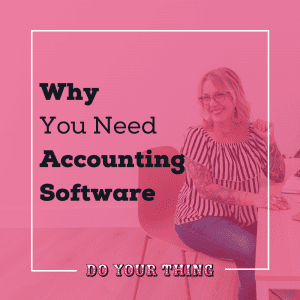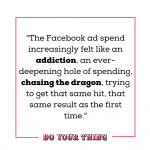3 Reasons You Need Accounting Software for Your Small Business
As a confirmed spreadsheet nerd, I do feel ya on trying to do everything in Excel or Google Sheets. Spreadsheets are just genius for certain tasks.
So you wonder, “Do I need accounting software for my small business?”
I’m here to tell you that if you’re tracking financials for a business, then you would truly benefit from something more. Personally I’m a huge fan of Quickbooks Online, but there are other tools perhaps suited to other people, tools like Xero and Freshbooks, that can get you to the same place.
And what is that place?
Financial reports.
Yes, the end-all, be-all, ultimate Numero Uno reason why you want to quit spreadsheets when it comes to tracking your business’s numbers, is that nothing is going to generate a Balance Sheet and Profit & Loss for you like actual accounting software.
You need those financial reports both when you hand off your numbers to your tax person at year-end AND, most importantly, you need those reports year-round to help you manage what’s happening in your enterprise. And trust me: rare is the tax professional who can or will trust your Excel or Google Sheet for the preparation of your tax return. Rare!
To repeat: you need actual financial reports at year-end for tax purposes, and for management purposes. That second purpose — to inform you and your future-facing strategic decisions — THAT’s the really big deal. Reliable financial reports not only serve you up a clear view of the results of your decisions up to this point, since those decisions are reflected in your financials, but also create the best, most solid platform for decisions and actions for your future success.
Not to mention, remember PPP? Yeah, those Paycheck Protection Program loans that saved many a small business a$$ in 2020-21? Getting those loans, & getting those loans forgiven, all facilitated by solid financial reports.
Your precious time.
Reason #2 to invest in accounting software is, in short, robots. That is, you benefit from the artificial intelligence baked into Quickbooks and the like, which will save you from the data entry otherwise required to type transaction data from your bank’s website or statement into the spreadsheet you’re using to track your numbers. All these accounting apps are now set up so that you can connect them to your bank and credit card institutions, so that the transaction data comes down automatically. Your job is then only to check that expenses land in the right accounts. Fewer keystrokes means more time available to review what it all means.
Accounting software can save you time throughout the year, and it will also save time (and money) at tax time when you don’t have to go 13 rounds with your tax preparer to prove the numbers in your spreadsheet.
And: money.
Like I said, the benefit of accounting software for small businesses: it sets you up with good reports that save you money at tax time. Also, if you’re ever interested in saving money on other things — like refinancing, for example — or selling your business, readily-available reliable financial reports in a standard format is going to move that conversation along so much faster.
Caveat:
Because accounting software is, well, accounting software, there are nuances. The developers of course try to make Quickbooks and the like as user-friendly as possible, but bottom line: it’s still accounting. It’s as easy to make errors by clicking buttons, as it is for a professional bookkeeper to help you out of a jam. If you can, develop a relationship with someone who can check your work, help you get set up correctly, be on hand to answer the random inevitable question that will arise as you proceed.
Doing your own books is a great experience. I’m convinced nothing’s going to give you as deep an understanding of the impact of your decisions as being deep in your financials will. But do yourself a favor: increase the chances that you’re spending your precious time on what the numbers mean, rather than on typing them, by investing in actual accounting software. Yes, it’s another thing to learn, another monthly subscription, but if you want real clarity and solid data to guide your decision-making, you can’t beat it.
If I can help, let me know!




